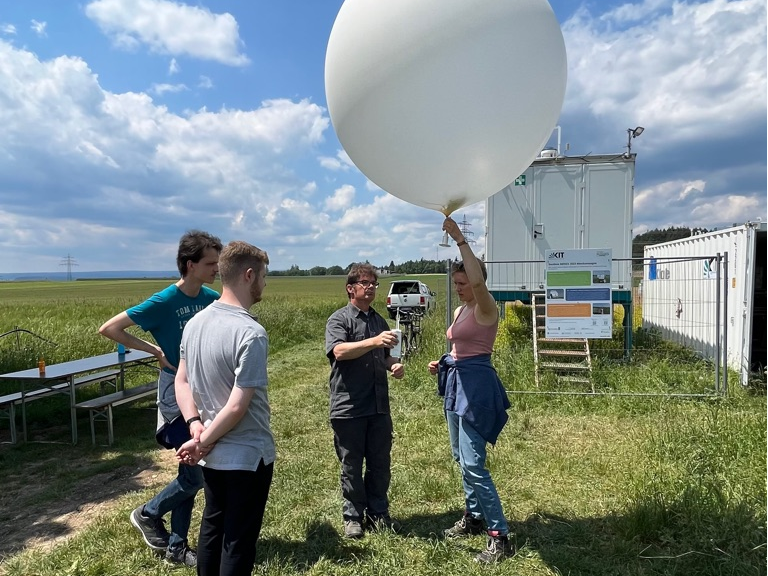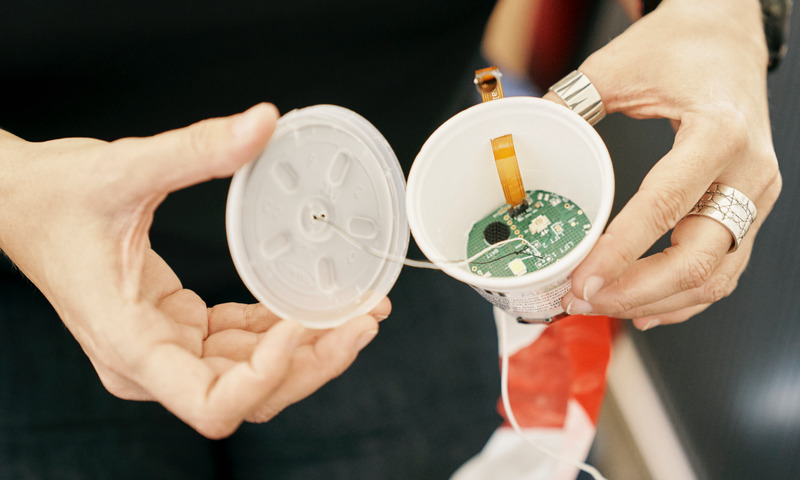The range of courses on offer expands with each selection round. This overview lists new and selected courses from the current round. The table on our homepage and on the RIRO-Grants page provides a complete overview of the courses.
The Weather Prediction Chain
| Contact person | Prof. Knippertz; Dr. Quinting, Dr. Oertel |
| Degree Programm | Master in Meterology and Climate Physics |
| Infrastructure | KITcube, TEEMLEAP |
| Number of participants | 10 |
| Scheduled from | Summer semester 2026 |
As part of the meteorological internship, Master's students experience the entire weather forecast chain, the individual components of which they otherwise learn about in separate courses. Students are given the opportunity to use the mobile observation platform KITcube to independently collect weather data, assimilate it in the “TEstbed for Exploring Machine LEarning in Atmospheric Prediction” (TEEMLEAP) and calculate their own weather forecasts on high-performance computers at KIT. Numerical and AI-based models are used so that the students can directly compare the prediction quality and computing costs. The knowledge gained will be recorded on Gitlab and in the form of a final report.
Computational Fluid Dynamics and Simulation Lab, Modelling, Algorithms, Simulation
| Contact person | Dr. Simonis, PD Dr. Krause, PD Dr. Thäter, Dr. Hörter, Prof. Frank |
| Degree Programm | All mathematics and engineering degree programs (especially process engineering), as well as computational and data science (also open to doctoral students) |
| Infrastructure | Tier-2 Rechensystem HoreKa, Tier-3 Rechensystem BwUniCluster |
| Number of participants | up to 50 in the internship, 20 in the seminar |
| Scheduled from | Winter semester 2025/26 |
Concept of two coordinated courses consisting of a practical course and a subsequent seminar - focus on mathematical-technical issues.
Practical course: teaching holistic solution approaches consisting of mathematical modelling, numerical mathematics, HPC, visualization, optimization and simulation data analysis for transport problems, for example in fluid dynamics. Students then use the skills they have learned in their own interdisciplinary projects to answer questions from current research. More information on the content here.
Seminar: Students' knowledge of HPC is further deepened and the fields of application expanded. Students learn how to carry out simulations independently, paying particular attention to the efficiency and sustainability of their code. Together with the HPC experts at the SCC, participants work on current research topics in engineering, climate and materials science. More information about the contents here.
AI-based chemical biology
| Contact person | Prof. Schepers |
| Degree Programm | Chemical biology, potential extension to computer science, process engineering |
| Infrastructure | 3ROCKIT (Helmholtz Acceleration Alliance) |
| Number of participants | |
| Scheduled from | Winter semester 2025/26 |
Self Driving Labs (SDLs) approach - autonomous robot-controlled FSI integrated into the new elective subject Biophysics (practical course & lecture) & specialization subject in Chem. Biology
Compulsory elective subject: 6-week internship - students learn how to implement hardware/software communication, database integration & programming - accompanied by 2 lectures (whereby there is a choice here, which is extended by two lectures as part of the RIRO project)
In-depth subject: content from the compulsory elective subject is deepened during a 6-week internship in an independent small research project on the SDL infrastructure
Advanced DeepLearning in Environmental Sciences
| Contact person | Prof. Kunstmann; Dr. Fersch, Dr, Chwala, Prof. Hinz |
| Degree Programm | Master in Remote Sensing and Geoinformatics |
| Infrastructure | TERENOpreAlpine/KIAOS |
| Number of participants | 20 |
| Scheduled from |
The aim is to use interdisciplinary examples from both computer science and environmental science backgrounds to sensitize students to the dilemma of the benefits and challenges of deep learning methods and to experimentally test the trade-off between quality of results and resource consumption on data collections from large-scale research infrastructures - here specifically KIAOS and TERENOpreAlpine. The course will be divided into two sections:
1. basic lecture
2. excursion to the TERENOpreAlpine infrastructures at the KIT Campus Alpin - here students work independently in small groups on a research topic




